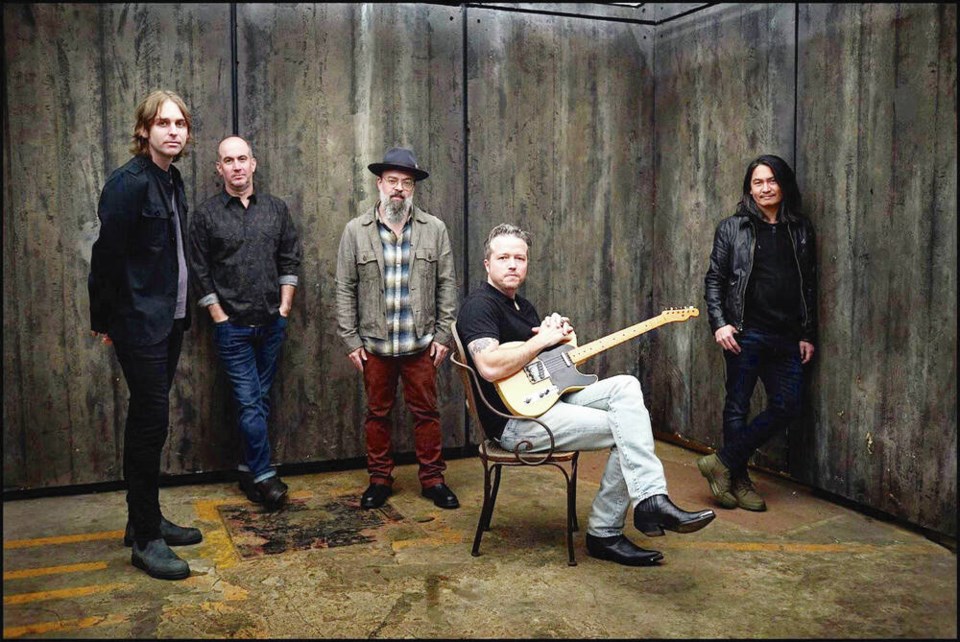JASON ISBELL & THE 400 UNIT
With: Kathleen Edwards
Where: Royal Theatre, 805 Broughton St.
When: Monday, March 6, 7:30 p.m.
Tickets: $114.50-$250 from the Royal McPherson box office or rmts.bc.ca
The current tour by Jason Isbell & the 400 Unit runs at a fairly heavy clip until Aug. 13, when the trek finally comes to a rest. That is nothing new for one of the hardest-working rock bands today.
The road can be an unforgiving place for a stretch of that length, but Isbell and his band will find solace in states such as Arkansas, Alabama and Georgia, where dates are booked. These are areas the four-time Grammy Award winner knows intimately, having spent the entirety of his life in and around the American South.
His roots in Muscle Shoals, Alabama, are especially deep. The 44-year-old songwriter, who is not doing press interviews on his current tour, was born in modest Green Hill, Alabama, and grew up three kilometres from the Alabama/Tennessee state line. The historic Muscle Shoals music scene in Alabama, where seminal recordings by Aretha Franklin, Wilson Pickett and Otis Redding were made, looms large for Isbell.
“There’s a magic here, from a musical perspective, that didn’t happen anywhere else,” Isbell said during an October interview with WAAY-TV in Huntsville, Alabama.
“I spend most of my time in Nashville but I tour and I’ve recorded in all kinds if places, L.A. and New York and all over the world, and I would put the best music from Muscle Shoals up against the best music from anywhere else on Earth. Once you tell people what songs were recorded here, they know that’s serious. It wasn’t just a music town, it’s a music town that had a real historical significance. Popular music has not gotten better than that.”
Isbell and his band, The 400 Unit — which is named after a mental health treatment facility in Florence, Alabama — will play the Royal Theatre in Victoria on Monday as part of the current tour, marking the rootsy singer-songwriter’s local debut. The show is expected to sell out, which isn’t surprising; he’s been a big concert draw for years, and in 2017 played an impressive six consecutive shows at the Ryman Auditorium in Nashville, home to the Grand Ole Opry, during which he sold 13,532 seats and grossed $621,324 US, acording to Pollstar.
His 2018 album, Live From the Ryman, which is among the highest-charting albums of his career, is a document of these performances.
Despite his background, and the twang with which he sings, Isbell and country music often make for strange bedfellows.
“Somehow I wind up in the country music conversation a lot, but I don’t think I’m necessarily a country artist,” Isbell said in an interview with AL.com. ”And I think the people who listen to my music realize that. But I think people who don’t know really anything about me just sort of think I’m a country artist. But I don’t make pop country music, and I’ve never been interested in that in the least.“
Isbell remains a big booster of the area around where he grew up. Songs like Alabama Pines and TVA, about the Tennessee Valley Authority, and albums such as Southeastern (2013), The Nashville Sound (2013), and Georgia Blue (2021), have made him the region’s unofficial spokesperson. That isn’t something Isbell takes to heart as he navigates his evr-blossoming career.
“It’s about more than serving yourself, I think,” Isbell told WAAY-TV. “I’m not personally satisfied if I just came back to my hometown, played a couple shows, got a cheque and went back to Nashville. That wouldn’t be enough for me. I need to feel like I’ve left something behind that’s at least a little bit better than it was when I got there.”
Isbell was a member of Drive-By Truckers from 2001 to 2007, when the Georgia-based rock band (consisting of several Alabama natives) was at its critical and commercial peak. He was 22 when he joined the group as a guitar player, and developed over the course of three studio albums into a fine songwriter. He left Drive-By Truckers in 2007, in the throes of addiction, and went solo.
“I’m not a depressive person, but I certainly can get very sad,” he told AL.com. “I’m sure anybody that’s heard my music would know that. A good way to keep myself from just being pulled down with the tide with all the dark, sad stuff that’s happening in the world right now is just be where I am and be aware. And out of that comes this sort of natural appreciation for it.”
Isbell got sober in 2012, with help from his wife and occasional bandmate, Amanda Shires, and wrote extensively about his struggles with alcohol on Southeastern. The recording, which prompted Bruce Springsteen and John Prine to sing his praises, introduced Isbell to wider audiences, but his writing grows deeper with each release. He earned five Grammy Award nominations between 2016 and 2022, winning four during the six-year period.
His eighth album, Weathervanes, is due June 9. The album that preceded it, Georgia Blue, consisted solely of cover songs written by artists from the titular state. Weathervanes is expected to be much more of a personal affair.
“There is something about boundaries on this record,” Isbell said in a press release. “As you mature, you still attempt to keep the ability to love somebody fully and completely while you’re growing into an adult and learning how to love yourself.”


-thumb.png;w=120;h=80;mode=crop)
